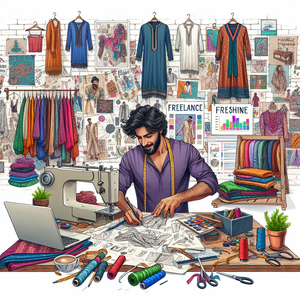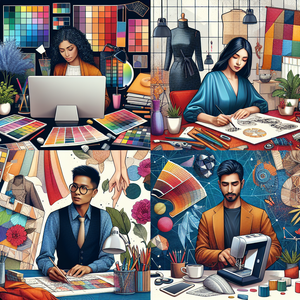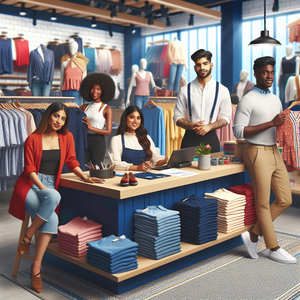
Your Ultimate Guide to Freelance Fashion Design: Career Paths, Tips, and Opportunities
The world of freelance fashion design is a vibrant and ever-changing landscape brimming with opportunities for those who are passionate about style and creativity. Whether you envision yourself as a traditional fashion designer, a digital creator, or a fashion consultant, the options are plentiful. This guide serves to equip aspiring freelancers with essential insights into navigating this dynamic field, covering everything from educational pathways to effective networking strategies. While formal education can provide a foundation, having a strong portfolio and hands-on experience often proves to be even more crucial for attracting clients. Notably, successful freelancers can achieve impressive earnings, with some reaching six-figure incomes based on their expertise and niche. This article will address key questions about launching a freelance fashion career, offering actionable advice, industry insights, and vital skills necessary for success.
Job Summaries:
Freelance Fashion Designer:
- Freelance fashion designers create unique clothing and accessories tailored to clients' needs.
- A solid grasp of fashion trends, textiles, and garment construction is essential.
- While a degree in fashion design is beneficial, demonstrating creativity through a well-curated portfolio often carries more weight.
- Effective communication and negotiation skills are vital for managing client relationships.
- This role not only allows for creative expression but also offers the flexibility of self-directed scheduling.
Digital Fashion Designer:
- Fashion designers utilize software tools like Adobe Illustrator to craft designs.
- They produce digital sketches and prepare tech packs essential for virtual fittings.
- Proficiency in digital tools and an eye for detail are non-negotiable.
- A degree in fashion design or graphic design is typically required.
- Hands-on experience in digital modeling can set candidates apart.
- This role is increasingly relevant in the context of online fashion retail and virtual showcases.
Fashion Stylist:
- Fashion stylists curate outfits for various events and projects.
- Ensuring a cohesive look that reflects individual client styles.
- Researching trends and sourcing garments are key responsibilities.
- While formal education in fashion or marketing can help, many stylists thrive through networking and real-world experience.
- This role allows for significant self-expression.
- Can be pursued independently or through an agency.
Fashion Illustrator:
- Fashion illustrators create captivating sketches that bring designers' visions to life.
- Exceptional drawing skills and a deep understanding of fashion proportions are crucial.
- A background in illustration or fashion design is advantageous, alongside a portfolio that highlights both style and technical prowess.
- Typically working on a freelance basis, illustrators contribute their artistry to magazines, advertising campaigns, and designer portfolios.
Freelance Fashion Merchandiser:
- Fashion merchandisers play a pivotal role in promoting clothing lines through strategic marketing techniques.
- They analyze market trends and create marketing strategies to boost visibility.
- A degree in fashion merchandising or business is often sought after, paired with strong analytical skills.
- This flexible role allows freelancers to juggle multiple clients, making it an appealing choice for those who thrive on variety.
Custom Clothing Designer:
- Custom clothing designers focus on creating bespoke garments tailored to individual clients.
- This role involves designing, fitting, and altering pieces to meet specific requirements.
- A background in fashion design or tailoring is essential, along with the ability to communicate effectively with clients.
- This career allows for the satisfaction of crafting unique pieces while establishing strong client relationships.
Fashion Consultant:
- Fashion consultants offer expert advice on style and trends.
- Helping clients make informed wardrobe choices.
- Assessing clients' fashion needs and providing personalized recommendations are core responsibilities.
- A background in fashion design or retail is beneficial.
- Strong communication skills are paramount.
- This flexible role allows consultants to engage with diverse clients.
Fashion Event Coordinator:
- Fashion event coordinators manage the logistics of shows, launches, and promotional events.
- Essential skills include creativity, organization, and experience in event planning.
- A degree in event management can be advantageous.
- Coordinators play a crucial role in ensuring events run smoothly while promoting fashion brands.
Fashion Blogger/Vlogger:
- Creating content related to fashion allows bloggers and vloggers to share insights through articles or videos.
- Strong writing or video production skills, alongside a knack for engaging audiences, are key.
- While formal education isn't mandatory, understanding SEO and social media marketing can significantly enhance visibility.
- Successful content creators often monetize their platforms through sponsorships and partnerships.
Sustainable Fashion Designer:
- Sustainable fashion designers prioritize eco-friendly practices and materials in their creations.
- Their responsibilities include researching sustainable textiles and promoting ethical practices within the industry.
- A degree in fashion design or environmental studies can be valuable, complemented by a genuine passion for sustainability.
- This role is increasingly relevant as the demand for eco-conscious fashion continues to grow.
The freelance fashion design industry is ripe with opportunities for those willing to embrace creativity and innovation. Each role presents its own unique challenges and rewards, with pathways leading to substantial earnings and personal growth. To succeed in this dynamic field, aspiring freelancers should focus on building a compelling portfolio, networking effectively, and staying abreast of industry trends. By integrating actionable steps, relevant statistics, and personal anecdotes into their journeys, individuals can carve out distinctive paths in the freelance fashion landscape. As the industry continues to evolve, embracing diverse career opportunities will be essential for making a lasting impact in freelance fashion design.
Explore More Jobs

